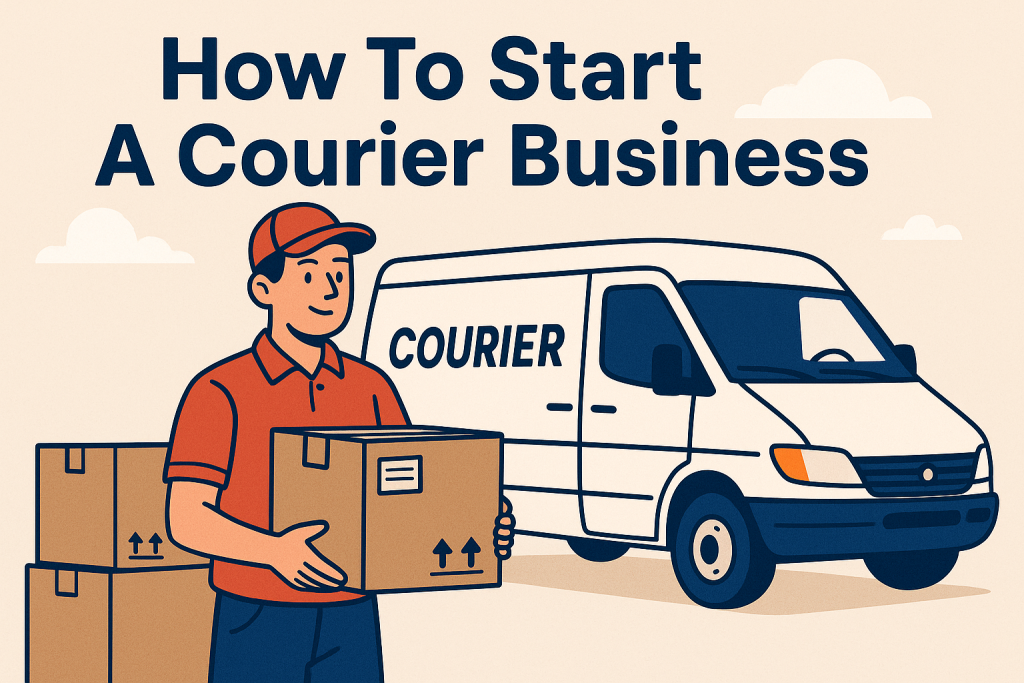Launching a delivery venture in today’s e-commerce driven economy presents excellent opportunities for entrepreneurs. If you’re wondering how to start a courier delivery business, begin by researching your local market demand and identifying underserved niches. Understanding courier service how to start requires analyzing competitor pricing, delivery zones, and service offerings to position your business effectively.
Many aspiring entrepreneurs ask how can i start my own courier service without breaking the bank. The answer lies in starting small with minimal overhead, perhaps beginning with a single vehicle and gradually expanding as demand grows. Learning how to start a delivery service business involves securing proper commercial insurance, obtaining necessary permits, and establishing reliable tracking systems for packages.
For those wondering how to start a small delivary bussines, focus on building relationships with local businesses that need regular delivery services. Understanding how to start courier service means developing efficient routing systems and maintaining excellent customer communication. The process of how to start courier service business also includes setting competitive rates while ensuring profitability.
When considering how to start my own courier business, create a solid business plan that outlines your target market and growth strategy. The process of starting a courier company requires dedication to punctuality and package safety, as your reputation depends on reliable service. Finally, knowing what do i need to start a courier business includes having proper vehicles, insurance coverage, delivery management software, and a strong commitment to customer satisfaction.
Imagine building a thriving enterprise that connects people with their most important items. The delivery industry powers modern life, moving everything from medical supplies to cherished gifts. This guide reveals how to tap into this $150 billion sector with minimal upfront costs and maximum flexibility.
Modern courier services fill a critical gap in local logistics. While major carriers handle bulk shipments, small businesses excel at same-day deliveries and personalized service. With e-commerce growing 15% annually, demand for reliable local transporters has never been higher.
Launching requires surprisingly little capital – many successful operators begin with under $1,000. Dedicated drivers can earn up to $72,000 yearly, making this one of the most accessible entrepreneurial ventures available today. You’ll need basic tools: a reliable vehicle, smartphone, and determination.
This industry rewards hustle and smart planning. Whether focusing on legal documents, perishable goods, or retail partnerships, your service becomes the vital link between businesses and their customers. We’ll explore proven strategies for standing out in competitive markets while maintaining healthy profit margins.
Key Takeaways
- Courier services address growing demand for fast, localized delivery solutions
- Startup costs often fall below $1,000 with strong earning potential
- Specialization increases value (medical supplies, legal documents, etc.)
- E-commerce growth drives 15% annual industry expansion
- Home-based operations minimize overhead costs
- Same-day services command premium pricing
Understanding the Courier Business Landscape
The delivery sector thrives on specialization. Three distinct models dominate: hyper-local operations, urgent transport networks, and global logistics. Each serves unique client needs while sharing a common goal – moving goods efficiently.
Exploring Service Specializations
Local couriers excel at same-day deliveries within cities. They handle legal papers, restaurant meals, and retail orders. Time-sensitive transporters focus on medical samples or corporate contracts requiring immediate attention.
International operators manage cross-border shipments. These experts navigate customs regulations and extended transit times. Many small companies combine elements from multiple categories to serve diverse markets.
Riding the E-Commerce Wave
Online shopping grew 55% faster during the pandemic. This surge created demand for last-mile delivery partners in suburban and rural areas. Local operators now compete with national carriers through personalized service and flexible pricing.
Urban centers see rising demand for eco-friendly options. Bicycle couriers and electric vehicles handle short routes in crowded metro areas. Rural providers often specialize in temperature-controlled items like farm produce or pharmaceuticals.
Smart entrepreneurs identify gaps in their regions. Some focus on fragile art shipments, while others prioritize 24/7 availability. The key lies in matching services to unmet community needs.
Benefits of Starting a Courier Business
Flexibility and low overhead make courier ventures attractive in today’s economy. Operators enjoy unique advantages that traditional businesses often lack, from instant payments to location freedom. Let’s explore why this model stands out.
Why a Courier Service is a Smart Business Choice
Entrepreneurs value delivery operations for their immediate cash flow. Unlike other ventures waiting weeks for payments, most courier jobs settle upon completion. This keeps bank accounts healthy and stress levels low.
“The best businesses adapt to your life, not the other way around. Courier work lets you build income around existing commitments.”
Home-based setups slash expenses. No storefront leases or pricey equipment needed – just a reliable vehicle and smartphone. The IRS sweetens the deal with 55¢ per mile tax deductions, putting money back in your pocket.
-
For entrepreneurs looking to break into the healthcare logistics space, our guide on how to start a medical transportation business outlines everything from licensing requirements to vehicle setup.
| Advantage | Courier Services | Traditional Businesses |
|---|---|---|
| Startup Costs | $500-$2,000 | $30,000+ |
| Payment Speed | Same-day | 30-90 days |
| Location Needs | Anywhere | Fixed address |
| Schedule Control | Full flexibility | Fixed hours |
Urban or rural areas both offer opportunities. Restaurants need meal transporters, while law firms require document runners. Specializing in niche markets like medical supplies can boost profits further.
Many owners begin part-time, testing demand while keeping day jobs. As routes expand, transitioning to full-time becomes seamless. This low-risk approach makes delivery services ideal for first-time entrepreneurs.
Key Steps to Launch Your Courier Business
Smart groundwork separates thriving operations from stalled ventures. Before hitting the road, map your territory and legal requirements carefully. If you’re passionate about florals, this step-by-step guide on how to start a flower business offers everything you need to launch with confidence.
Entrepreneurs interested in logistics often develop a comprehensive courier business plan to establish successful delivery operations in their local markets. Understanding courier service business models helps identify profitable niches and operational strategies for sustainable growth.
Many aspiring business owners research how to start a courier company and start courier business approaches that leverage existing infrastructure and technology. Home-based operations include starting a courier business from home to minimize initial overhead costs while building client relationships.
Service development involves learning how to start a courier service and how to start a carrier service for specialized transportation needs. Business planning includes how to start a courier service business and starting a courier service with proper licensing and insurance requirements.
Growth strategies focus on how to grow courier business operations through marketing, technology adoption, and service expansion. Operational guidance includes how to start courier business processes and starting a courier service business with sustainable workflows.
Market understanding encompasses courier services business opportunities and courier business opportunities in different sectors. Expansion planning includes how to start a delivery service beyond traditional courier operations.
Setup considerations involve setting up a courier business with proper equipment and what is a courier business fundamentally provides to customers. Vehicle-based approaches include how to start a courier business with your own car for low-cost entry into the market.
Broader delivery services include how to start a delivery business and how to start courier company operations with multiple vehicles. Ownership approaches focus on how to start your own courier business and how to start your own courier service for complete operational control.
Independent business models include start your own courier business and starting a delivery business approaches that provide flexibility and growth potential. Basic operational questions include starting courier business fundamentals and courier service business plan development.
Startup guidance includes how do i start a courier business and how do you start a courier business for practical implementation steps. Financial planning involves how much does it cost to start a courier business and how to start a courier business from home with minimal investment.
Budget-conscious approaches include how to start a courier business with no money through creative financing and partnership strategies. Specialized services include how to start a parcel delivery business and parcel delivery business models for specific market segments.
Small-scale operations focus on small courier business approaches and start a delivery business models that serve local markets effectively. Service initiation includes start a delivery service and start own delivery business for independent operators.
Professional development involves start your own courier service and starting a delivery courier business with comprehensive service offerings. Market entry includes starting a delivery service and starting a delivery service business with proper planning and execution strategies.
Market Research Made Simple
Identify neighborhoods with high demand but limited providers. Track local law firms needing document runs or bakeries requiring fresh ingredient drops. Specialization increases profitability – 78% of successful operators focus on specific niches.
“Study traffic patterns and parking availability. What looks convenient on paper might become a logistical nightmare during rush hour.”
Set achievable milestones. Aim for 10 reliable clients in your first quarter rather than unrealistic city-wide coverage. Many owners begin with bicycle deliveries before expanding to vehicle fleets. Before investing in equipment or branding, check out this comprehensive overview on how registered nurses can enter the IV hydration market.
Legal Essentials Checklist
Choose your business structure wisely:
| Structure | Best For | Setup Time |
|---|---|---|
| Sole Proprietorship | Individual operators | 1-2 days |
| LLC | Asset protection | 2-3 weeks |
| Corporation | Multiple investors | 4+ weeks |
Secure your EIN through the IRS website in 15 minutes. This number becomes your business’s financial fingerprint for taxes and banking. Local permits vary – some cities require commercial vehicle licenses even for bikes.
Consult an attorney to review insurance needs. General liability coverage often starts at $40/month, while cargo insurance protects high-value items. Pair these steps with a memorable business name that’s available as a .com domain.
Developing a Strong Business Plan for Courier Services
Crafting a roadmap separates thriving delivery operations from those stuck in neutral. Your blueprint should address financial realities while carving out competitive advantages.
Budgeting, Funding Options, and Equipment Needs
Startup expenses typically range from $2,500-$15,000 depending on fleet size. Essential costs include:
- Vehicle deposits ($500-$2,000)
- Cargo insurance ($60-$150/month)
- Route planning software ($30-$100/month)
“Treat your first vehicle as a profit generator, not just transportation. Every mile should contribute to growth.”
Funding avenues vary based on credit history and needs. Compare these options:
| Source | Best For | Average Rate |
|---|---|---|
| Personal Savings | Small purchases | 0% interest |
| SBA Microloan | New operators | 6.5-13% |
| Equipment Financing | Vehicle upgrades | 4-10% |
Analyze local rivals through mystery shopping. Note their response times and pricing tiers. Medical document specialists often charge 25% more than general providers.
Define your niche clearly. Law firms need discreet handlers, while florists require climate-controlled transport. Tailor your business plan to address these specific needs.
Build buffer funds for unexpected repairs or fuel spikes. Successful operators keep 3 months’ operating costs in reserve. This cushion ensures smooth deliveries during slow seasons.
How To Start A Courier Business: Essential Equipment and Supply Needs
The backbone of any successful delivery operation lies in its tools and technology. Smart equipment choices boost efficiency while building client trust. Let’s explore what keeps wheels turning in this fast-paced industry.
Selecting the Right Vehicles and Technology
Urban routes thrive with nimble options like cargo bikes or compact electric vans. Suburban areas often require mid-sized vehicles with extended range. Prioritize reliability over flashy features – breakdowns cost more than upfront investments.
Modern tracking systems prove essential. GPS software helps customers monitor shipments in real-time. Route optimization algorithms slash fuel costs by 18% on average, according to recent logistics studies.
Don’t overlook basic supplies. Weatherproof packaging protects sensitive items, while branded uniforms create professional impressions. Balance initial expenses with long-term savings – quality gear pays dividends through repeat business.
Tech upgrades should simplify operations, not complicate them. Cloud-based dispatch platforms let managers coordinate drivers from any location. These tools become force multipliers as your client base grows.
-
Many entrepreneurs overlook early expenses, but knowing the true cost of a business license can help avoid budgeting surprises later on.







